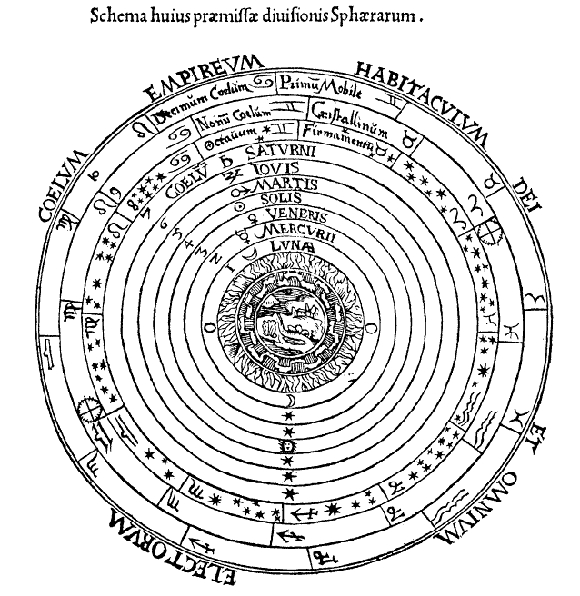Othello Contents
- Religious/ philosophical context
- Theatrical context
Astronomy and astrology
Definitions
- Astronomy studies the movement of the planets and stars
- Astrology deals with the supposed influence of the stars on human life.
This distinction is a modern one, however: while astrology is regarded as a pseudo-science today, for centuries it was accepted as a way of explaining and predicting terrestrial events. Before the seventeenth century, astronomy and astrology were not usually separated, and observation of the ‘heavenly bodies' was accompanied by ideas about their effects on man and his earthly habitat.
 Astronomy
Astronomy
A universal study
All settled civilisations have studied astronomy:
- Knowledge of the movement of the moon and the sun was vital for a pre-industrial society, as a way of telling the time
- The codification of such knowledge produced a calendar, by which the best periods for sowing, reaping, herding and other activities could be determined
- Observation of the stars was also necessary for sea navigation and long land journeys
The calculations involved in this study made astronomy a main stimulus for mathematics.
Astrology
The influence of the heavenly bodies
Astrology describes the influence of the stars on human life. It was generally accepted until about 1600. Because the sun is the source of life, and the moon causes tides, it was felt that other heavenly bodies must also influence the earth. In the absence of modern science, this helped explain human behaviour and terrestrial phenomena, and allowed for predictions.
The planets
According to astrology, each planet has an individual influence:
- Jupiter (Jove) disposes someone to be merry or ‘jovial'
- Mars and Venus influence humans to be warlike ('martial') or loving respectively
- The influence of Mercury is seen in the term ‘mercurial' (lively and unpredictable)
- A ‘lunatic' is affected by the lunar cycle of the moon
- The influence of Saturn is seen in the adjective ‘saturnine' (having a gloomy temperament or appearance)
- Planets also dominate particular days of the week (Sun-day etc.).
Planetary influence is affected by the planets' relation to each other (their constellation or aspect). Though planets could influence human behaviour, they could not determine it since, in Christian thinking, man has free will (see Romanticism: Determinism and free will).
The stars
If the geocentric universe is pictured as a circle, it can be divided like a cake into twelve equal slices. For about a month (starting on March 21st), each ‘slice' will appear in the east where the sun rises. This segment is said to be ‘in the ascendant'.
Each segment has a distinct grouping of stars, referred to by the signs of the Zodiac: Aries (the Ram), Taurus (Bull) , Gemini (Twins), Cancer (Crab), Leo (Lion), Virgo (Virgin), Libra (Scales), Scorpio (Scorpion), Sagittarius (Archer), Capricorn (Goat), Aquarius (Water-carrier), Pisces (Fishes). The stars in the ascendant were believed to further affect the influence of the planets passing through them.
In Othello, there is a reference to the Bear constellation and the stars which are ‘the guards of th’ever-fixed pole.’ (star)
Credibility
There were some scholarly attacks on astrology in the sixteenth century, but in general people from all social ranks turned to astrologers to help them make important life decisions. The mathematics behind it seemed dazzling and there was no alternative explanation of most events. Astrology also provided a satisfying link between the earth and the rest of the universe. Astrology thus formed part of the general way of thinking until it was displaced by modern science from the seventeenth century. When Edmund laughs at his father Gloucester in King Lear for ascribing events to the stars, it is a sign of a shift in belief at this time.
Language
The impact of astrology can be traced in language:
- ‘influence’ itself comes from the idea of power flowing in from the planets and stars
- ‘dis-aster’ refers to a ‘bad star' having a malign influence.
